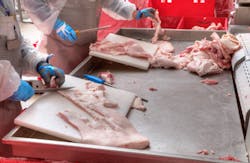Food processors should take public opinion into account when using processing aids, expert claims
Processing aids — substances food processors and producers rely on to fight various types of bacteria — are very useful when eliminating E.coli from meat, poultry and other food products, explained James Marsden, distinguished regents professor of food science at Kansas State University, in an interview with Food Safety News. The definition of a processing aid is a substance that is used in food production but is not present in any notable amount in the end product, he stated. Unfortunately, this is only an ideal definition and there are instances which prove that processing aids are sometimes a controversial matter.
Although producers can only use chemicals that have been approved by the two agencies, a perfect end result is not always guaranteed. The industrial-like ammonia process that Beef Products Inc. used to make its beef have a leaner texture which the public knows as "pink slime" is an example that instantly comes to mind. Another questionable substance that companies use is the transglutaminase powder known as "meat glue," stated Marsden, who played a significant role in reducing Shiga Toxin-producing Escherichia coli in beef.
RELATED: Top beef producer closes plants due to 'pink slime' scare
Overall, processing aids can be very effective when dealing with E.coli, he added. Those that regulators have approved are not supposed to change the appearance or taste of the product in any way and, more importantly, they cannot negatively impact food safety or public health. Strictly speaking, there are three types of processing aids. The first one consists of substances that are added during processing but are removed before the product is packaged. The next type is added substances that are converted into constituents normally found in the food. Finally, the third group comprises substances that are added to a food and are present in the finished product at levels that do not have any effect on the product.
The problem is that processing aids are not considered ingredients and therefore are not required to be listed on ingredient lists on nutrition labels, which means that processors can use many types of processing aids without having to publish this information, Marsden commented. This could cause potential problems, similar to those with the "pink slime" that was dropped by processors after the public reaction in 2012.
Marsden claims that food companies should be aware of how consumers view chemicals. There are substances that the vast majority of consumers would see as safe, including lemon juice, vinegar or citric acid. Fruit and vegetable washes that typically contain natural acids or chlorine are also generally accepted. However, there are others that should be avoided where possible, in order to respond to public concerns, he stated.

